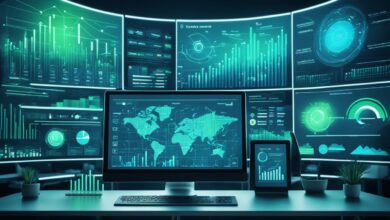How AI is Influencing the Job Market

Artificial Intelligence (AI) transforms the job market. AI technology automates tasks and creates new opportunities. AI’s relevance grows as industries integrate AI into operations. The World Economic Forum predicts a 40% rise in job openings for AI specialists by 2027. AI’s impact extends beyond tech, influencing sectors like healthcare and finance. Understanding AI’s role becomes crucial. AI Influencing Job Market dynamics demands attention. AI reshapes employment landscapes. The potential for job displacement exists. However, AI also promises economic growth and innovation. Embrace AI’s influence and prepare for future changes.
AI Influencing Job Market: The Role of AI in Job Creation

New Job Opportunities
AI in Tech Industry
AI technology creates a surge of opportunities in the tech industry. Companies seek skilled professionals to develop and maintain AI systems. AI engineers and data scientists find themselves in high demand. These roles require expertise in machine learning and data analysis. AI Influencing Job Market dynamics lead to competitive salaries and benefits for tech professionals. The tech sector experiences rapid growth due to AI advancements.
AI in Healthcare
Healthcare benefits significantly from AI integration. AI tools assist doctors in diagnosing diseases with greater accuracy. Hospitals employ AI to manage patient records efficiently. AI Influencing Job Market trends create new roles for AI specialists in healthcare. Medical professionals collaborate with AI experts to enhance patient care. AI-driven innovations improve treatment outcomes and operational efficiency.
AI-Driven Startups
Emerging AI Companies
AI-driven startups emerge as key players in the market. These companies leverage AI to offer innovative solutions across industries. AI Influencing Job Market trends encourage entrepreneurs to explore AI applications. Startups focus on developing AI-powered products and services. These ventures create a variety of job roles, including AI trainers and data analysts. The startup ecosystem thrives on AI’s transformative potential.
Investment in AI Innovation
Investors recognize the potential of AI technologies. Financial backing fuels the growth of AI-driven startups. Venture capitalists invest heavily in AI innovation. This investment leads to the creation of numerous job opportunities. AI Influencing Job Market dynamics attract talent to these startups. Employees benefit from working in cutting-edge environments. AI innovation continues to drive economic growth and job creation.
AI Influencing Job Market: AI and Job Displacement
Automation of Routine Tasks
AI technology automates routine tasks across various industries. Manufacturing jobs face significant changes due to AI’s capabilities. Machines now handle repetitive tasks, reducing the need for human labor. Workers in manufacturing must adapt to new roles that require advanced skills. The shift in job responsibilities creates a demand for upskilling.
Administrative roles also experience transformation with AI integration. AI tools streamline processes like data entry and scheduling. Employees focus on more strategic tasks as AI handles routine duties. Administrative professionals must enhance their skill sets to remain competitive. Continuous learning becomes essential in this evolving landscape.
Sectors Most Affected
Retail and customer service sectors feel the impact of AI automation. AI-powered chatbots and virtual assistants manage customer inquiries. Human employees now concentrate on complex interactions requiring empathy. Retail workers must develop skills in areas like customer relationship management. The shift in focus enhances customer experiences and business outcomes.
Transportation and logistics industries undergo significant changes with AI adoption. Autonomous vehicles and drones revolutionize delivery processes. Workers in these sectors face job displacement due to technological advancements. However, new opportunities arise in managing and maintaining AI systems. Employees must embrace continuous learning to thrive in this dynamic environment.
AI Influencing Job Market dynamics present challenges and opportunities. Workers must adapt to the changing landscape by acquiring new skills. Embracing AI’s potential leads to growth and innovation across industries. The future of work depends on the ability to navigate these transformations successfully.
Evolution of Job Roles
Hybrid Job Roles
Combining AI with Human Skills
AI technology transforms job roles by merging human skills with machine capabilities. Workers must adapt to new environments where AI tools assist in daily tasks. AI enhances decision-making and problem-solving abilities. Employees can focus on creative and strategic aspects of their roles. AI-driven tools handle data analysis and routine processes. This collaboration leads to increased productivity and innovation.
Examples of Hybrid Roles
Hybrid roles emerge across various industries. Data analysts use AI algorithms to interpret complex datasets. Marketing professionals leverage AI for customer insights and targeted campaigns. Healthcare workers employ AI for accurate diagnostics and personalized treatment plans. These roles require a blend of technical knowledge and human expertise. Workers must embrace AI to excel in these evolving positions.
Upskilling and Reskilling
Importance of Continuous Learning
Continuous learning becomes essential in an AI-driven job market. Workers must acquire new skills to remain competitive. AI technologies evolve rapidly, creating a demand for updated knowledge. Employees should pursue training to enhance their expertise. Upskilling ensures adaptability in changing work environments. Companies value workers who commit to lifelong learning.
Training Programs and Initiatives
Training programs support skill development in the workforce. Organizations offer courses to teach AI-related skills. Online platforms provide accessible learning opportunities. Workers can enroll in workshops and seminars to gain practical experience. Government initiatives promote reskilling for displaced workers. These programs prepare individuals for future job roles. Embracing training leads to career advancement and job security.
AI influences job roles by fostering human-machine collaboration. Workers must adapt to hybrid roles and prioritize continuous learning. Upskilling and reskilling become crucial in this dynamic landscape. Embrace AI’s potential to thrive in the evolving job market.
Future Trends in the AI Job Market
AI in Emerging Industries
AI in Renewable Energy
AI transforms the renewable energy sector. Companies use AI to optimize energy production and distribution. AI algorithms analyze weather patterns to predict energy output. This technology improves efficiency and reduces costs. AI Influencing Job Market trends create new roles in this industry. Engineers and data scientists work together to enhance renewable energy systems. Embrace AI to drive sustainable energy solutions.
AI in Cybersecurity
AI revolutionizes cybersecurity. Organizations deploy AI to detect and prevent cyber threats. AI systems analyze vast amounts of data to identify vulnerabilities. Security experts collaborate with AI to protect sensitive information. AI Influencing Job Market dynamics lead to increased demand for cybersecurity professionals. Companies seek skilled individuals to manage AI-driven security tools. Prepare for a future where AI safeguards digital assets.
Skills for the Future
Technical Skills
AI demands proficiency in technical skills. Workers must understand machine learning and data analysis. Programming languages like Python become essential. AI Influencing Job Market trends highlight the need for technical expertise. Companies value employees who can develop and maintain AI systems. Invest in technical training to remain competitive in the job market.
Soft Skills and Adaptability
Soft skills gain importance in an AI-driven world. Communication and problem-solving abilities become crucial. Workers must adapt to changing environments and embrace innovation. AI Influencing Job Market trends emphasize the need for adaptability. Employers seek individuals who can collaborate effectively with AI tools. Focus on developing soft skills to thrive in the evolving job landscape.
AI continues to shape the future of work. Emerging industries benefit from AI’s transformative potential. Workers must acquire technical and soft skills to succeed. Embrace AI’s influence and prepare for the opportunities it presents.
AI reshapes the job market with dual effects. Automation displaces some roles but creates new opportunities. Workers must focus on complex tasks as AI handles routine ones. Adaptability becomes crucial for success. Continuous learning ensures competitiveness in an evolving landscape. Professionals should adopt strategic learning approaches. Embrace AI’s potential and prepare for future changes. Leaders must anticipate skill demands and prepare their workforce. A proactive approach secures a place in the AI-driven job market. Seize the opportunity to thrive in this transformative era.



